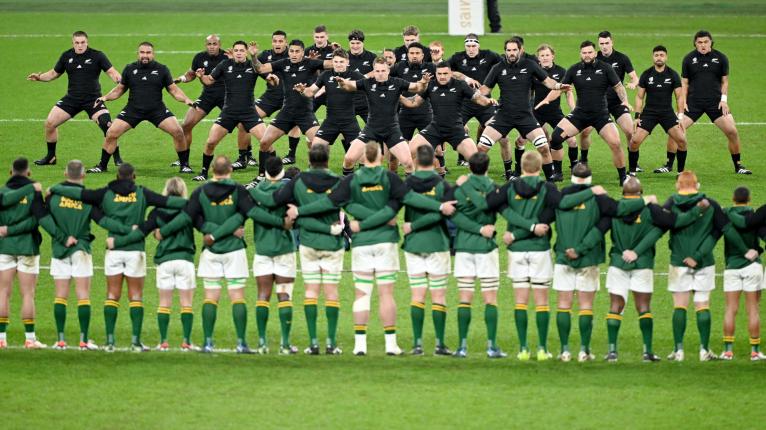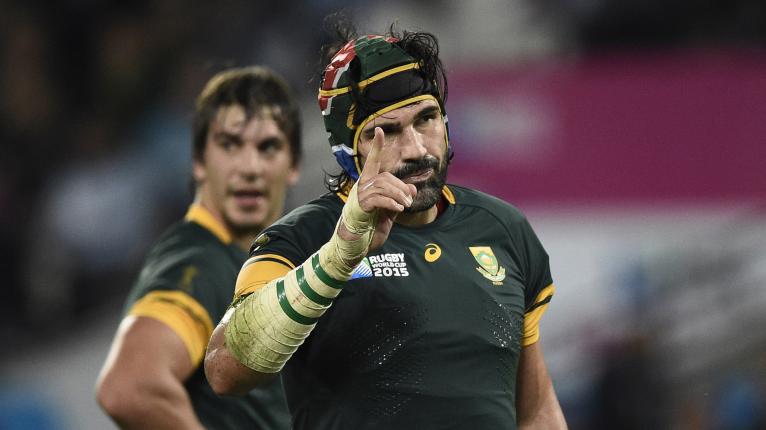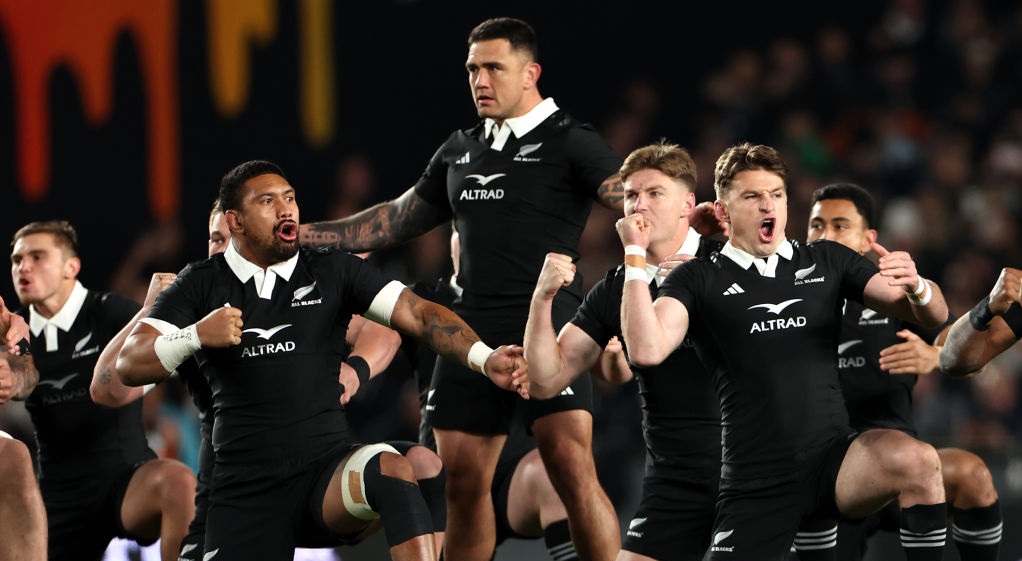The Haka is a challenge - it should be met in kind

SA Rugby is “distressed”. That is the word used by the organisation’s CEO, Rian Oberholzer, who personally wrote a letter to the New Zealand Rugby Football Union to express just how sorry everyone was.
The cause of all this angst? It’s the only most egregious crime known to rugby. Something so despicable that surely the rest of the Rugby Championship, let alone next week’s Test between the All Blacks and the Springboks, might be abandoned in disgust.
I’m referring to the abominable treatment of the Haka before kick-off in Johannesburg on Saturday that has forever stained a century-old rivalry and besmirched the good standing of all South Africans.
Was all of the above a touch hyperbolic? Well, what about the reaction to the stadium DJ blasting house music while a gigantic aeroplane overhead combined with the capacity crowd to drown out TJ Perenara’s cries? Instead of the usual silence, the All Blacks were faced with a hurricane of noise.
Since then there has been endless hand-wringing, fist-shaking and tut-tutting on social media and beyond. Former Boks captain John Smit was incredulous as he expressed his “disappointment” and demanded for more “respect” in Cape Town. New Zealand’s coach Scott Robertson couldn’t fathom what he’d witnessed. Countless other pundits and punters have fallen over themselves, desperately seeking to prove that they are true disciples of rugby’s values.
Now don’t get me wrong. I love the Haka. Seeing it live should be near the top of every rugby fan’s bucket list. It sends shivers down the spine, conjures goosebumps on the arm and causes a quickening of the pulse that elevates contests against the All Blacks even before the opening whistle.
It is, of course, also steeped in a sacred context. The great Sean Fitzpatrick once became so angry with me after I branded the Haka a “war dance” that he threatened to end the interview if I didn’t immediately apologise and acknowledge what it meant to Maori history.
I get it. The spiritual significance cannot be understated. Every player who performs it must feel themselves tethered to an ancient past as they stand on the shoulders of giants who have come before them. Performing it while wearing that iconic black jersey must be one of life’s greatest privileges.
But that does not mean that every other culture, or indeed every other rugby nation, is compelled to regard the Haka in the same light simply because it is so important to New Zealanders. We live in a multicultural world, and the diversity of rugby is one of the sport’s most appealing traits. But that does not mean that one symbol, or one gesture, should be universally revered.

A Haka on home soil is a different matter. Showing it deference in Hamilton or Christchurch would be akin to saying grace before a meal in a Christian home even if you yourself were not religious. But if a guest came to your home and insisted on imposing their values and customs on your family, while expecting you to be obsequious to their ceremonies, don’t you think you’d at least have second thoughts about the character of your guest?
Would anyone in New Zealand rugby be compliant if SA Rugby expected three burly Zulu warriors to perform a war dance right before kick-off in Auckland? Of course not. Then why are we all expected to comply with the All Blacks’ apparent right to perform the Haka before kick-off in Pretoria, London or Sydney?
Maybe it’s for the sake of the spectacle. I remember speaking with Kobus Wiese as he recalled his encounter with Jonah Lomu at the 1995 World Cup final. As the All Blacks carried out their synchronised moves at Ellis Park they inched towards the Springboks line. Wiese responded and edged forwards himself. By the time the Haka was over, both behemoths were practically nose-to-nose.
Wiese, like Matfield, will likely disagree with the content of this column. “I hate it when fans boo or whistle or sing over [the Haka],” Wiese told me. Matfield added, “It’s genuinely one of the great things about our game.”

No arguments here, but that doesn’t add up to such yielding civility. Rugby is a game of respect but also of aggression and dominance. What’s wrong with meeting hostility with hostility? As long as no-one turns their back on the Haka then surely anything is fair game.
According to the New Zealand government’s own promotional website, the Haka traditionally “served to invigorate warriors as they headed into battle”. It might not merely be a war dance, as Fitzpatrick assumed I was suggesting, but it is at least partly a war dance. And if they want to intimidate and lay down a challenge then they should expect one right back at them on foreign soil.
A frothing crowd, a screaming Airbus overhead and the shrill blasts of Sister Bethina seems like an appropriate response to me. I hope that South Africans continue to show the Haka the respect it deserves by meeting with it in kind.




































Farrell's wink. Legendary.
Other team stand still? Get over yourselces
Farrell's grin and wink were perfect:
'We have you.
You know we have you.
We know that you know that we have you.
The funnel formation of England players meant that they were all concentrating on only Farrel's face too.
NZ looked completely unnerved after it.
World rugby have stopped any opposing team doing any response to the haka, just ask Richard Cockerill. Now you have to stand stationary behind your 10 metre line, cooling down losing adrenaline, while New Zealand keep warm and peak their adrenaline for the start of the match. To counteract this advantage, have the Haka before the anthems.
Reading through the comments section - particularly moved by the references to intercourse with farm animals. I hope it’s all consensual?
Night night skaapnaaier!
The Haka has to be tolerated. But there should be no whining by NZ about respect or any other horseh1t. Don't take the p1ss please.
let us know how your video turned out sheep shagging saffa stevie second thoughts yeah nah
It's really way past your bedtime! And Fluffy and Larry must be so worried. Off with you, moffie.
The haka is great. But I think that the all blacks and maybe some of their fans are making too much of this…
They should pay more attention to winning games.
Wrong. The All Blacks group is definitely not making "too much of this". Or any distraction. Go read &/or listen to articles & interviews from coaches & players. Their focus is fixed firmly on Cape Town.
The Haka is not sacrosanct and nobody is under any obligation to accept it or to stand there and take it without a response but then again it is deeply important to NZ Rugby, the fans, the players, the traditions of the Maori people etc. I believe in sport it is important to respect your opponent and to show them deference even though you need not do it. Its called the spirit of the game. In the spirit of the contest between 2 great nations that have deep respect for one another and who are currently planning further engagements and closer ties like long tours to one another surely SA must then show deference and respect to their opponents traditions and standing there and accepting the challenge without engaging in your own theatrics is just good sportsmanship.
The players always show deference to the Haka. Are you talking about supporters?
Perhaps you should ask World Rugby to insist on supporters receiving clear instructions on how to respond to this Maori tradition.
My own belief is if this tradition (which gives an advantage to NZ) gives so much offense if not observed correctly by every opponent supporter then it has no place in a rugby match.
As an Irish supporter we had to endure Rioke Ioane gesturing to the Irish spectators after the Irl/NZ match in apparently related to total silence not observed for the Haka. What about the tradition (and law) about not being an a$$hole to opposing spectators?
When do we get an apology?
Move on already please. The plane was a timing issue. The DJ was an idiot. The booing is unfortunately something that is all sports and, in all countries, now, I hate it and the crowed should not do it.
However, I have no issue withe crowed responding with Ole Ole Ole or something similar.
We were all moving on and then you turned up. Move on.
Hardly abominable, move on.
What happened to the jets though?
The players and the crowd can react to the haka however they want. The haka is a challenge, and they have the opportunity to respond. This is a key important part of haka in Māori culture.
However, the DJ playing music over the speakers was totally unnecessary and blatantly disrespectful. That should not be done ever again. It's not a part of tradition.
An accident. Not intentionally disrespectful. Even to an honorary white Maori such as yourself.